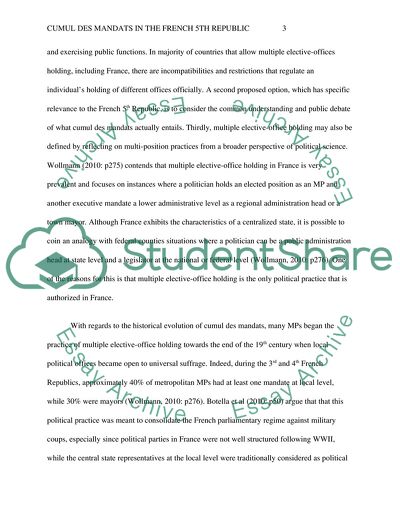Cite this document
(Cumul Des Mandats in the French 5th Republic Coursework Example | Topics and Well Written Essays - 2250 words, n.d.)
Cumul Des Mandats in the French 5th Republic Coursework Example | Topics and Well Written Essays - 2250 words. https://studentshare.org/politics/1854654-what-are-the-advantages-and-disadvantages-for-french-politicians-and-for-the-practice-of-democracy-of-multiple-elective-office-holding-cumul-des-mandats
Cumul Des Mandats in the French 5th Republic Coursework Example | Topics and Well Written Essays - 2250 words. https://studentshare.org/politics/1854654-what-are-the-advantages-and-disadvantages-for-french-politicians-and-for-the-practice-of-democracy-of-multiple-elective-office-holding-cumul-des-mandats
(Cumul Des Mandats in the French 5th Republic Coursework Example | Topics and Well Written Essays - 2250 Words)
Cumul Des Mandats in the French 5th Republic Coursework Example | Topics and Well Written Essays - 2250 Words. https://studentshare.org/politics/1854654-what-are-the-advantages-and-disadvantages-for-french-politicians-and-for-the-practice-of-democracy-of-multiple-elective-office-holding-cumul-des-mandats.
Cumul Des Mandats in the French 5th Republic Coursework Example | Topics and Well Written Essays - 2250 Words. https://studentshare.org/politics/1854654-what-are-the-advantages-and-disadvantages-for-french-politicians-and-for-the-practice-of-democracy-of-multiple-elective-office-holding-cumul-des-mandats.
“Cumul Des Mandats in the French 5th Republic Coursework Example | Topics and Well Written Essays - 2250 Words”. https://studentshare.org/politics/1854654-what-are-the-advantages-and-disadvantages-for-french-politicians-and-for-the-practice-of-democracy-of-multiple-elective-office-holding-cumul-des-mandats.


